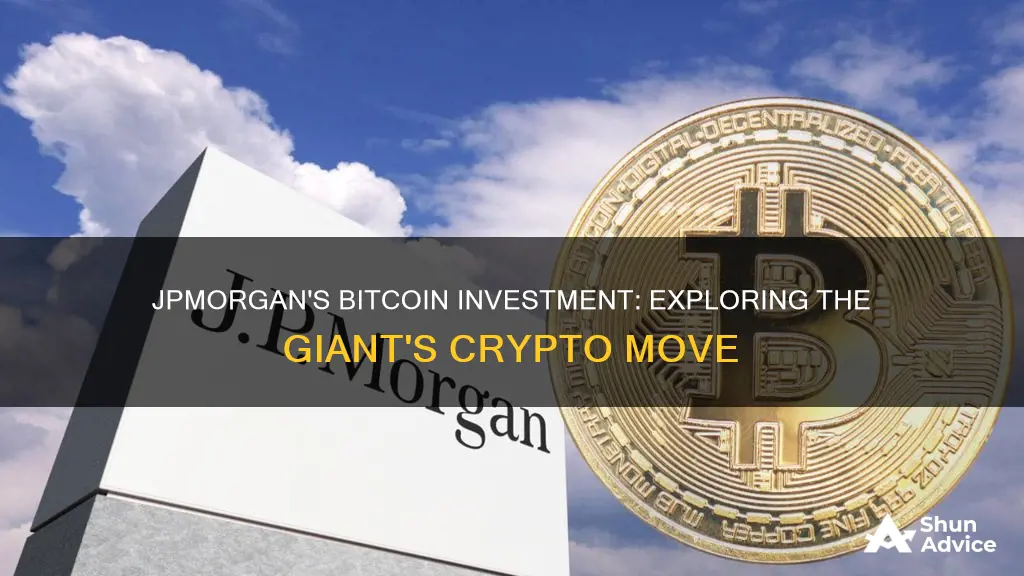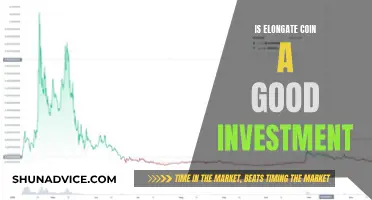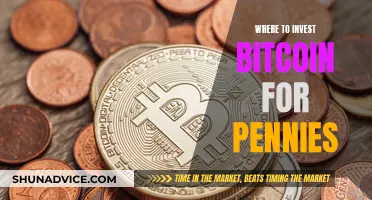
JPMorgan Chase & Co., the largest bank in the US by asset size, has been an outspoken critic of Bitcoin and crypto, with CEO Jamie Dimon calling it a fraud and a decentralized Ponzi scheme. However, in a surprising move, JPMorgan has recently started to explore the potential of blockchain technology and cryptocurrencies. The bank has completed its first cross-border transaction using blockchain-based decentralized finance (DeFi) and is working on a blockchain-based payment and settlement system. In addition, JPMorgan has quietly unveiled access to a handful of crypto funds, signalling a shift in the bank's stance on digital assets.
What You'll Learn

JPMorgan's first-ever cross-border transaction using blockchain
Blockchain technology has the potential to revolutionize the way we make cross-border transactions, and JP Morgan has been at the forefront of these efforts. In September 2023, JP Morgan made headlines by exploring the use of blockchain technology to create a digital deposit token for faster and more efficient cross-border payments and settlements. This innovative payment system, pending approval from US regulators, aimed to provide JP Morgan's corporate clients with an easy and seamless way to transfer money to clients of other banks.
The deposit token, a digital coin representing a deposit claim against a commercial bank, has the potential to transform the traditional financial system. By utilizing blockchain technology, transactions can be processed almost instantly, leading to faster settlements and reduced transaction costs. This system would also connect to the bank's existing compliance systems to ensure necessary regulatory checks and reporting.
JP Morgan's commitment to blockchain technology was further demonstrated by its Onyx blockchain platform, which was used by Bahrain-based Bank ABC for cross-border payments. This marked one of the first commercial deployments of blockchain technology in this domain. The service, developed in collaboration with the Central Bank of Bahrain, was expected to be more cost-effective and significantly reduce settlement times compared to traditional solutions.
Naveen Mallela, from JP Morgan's Onyx blockchain division, emphasized the potential of blockchain to transform cross-border payments. He explained how shared ledger infrastructure could bring banks together on a single unit, enabling instantaneous debits and credits with optimal liquidity. The distributed nature of blockchain enhances transparency, trust, and security, making it ideal for cross-border transactions.
In addition, blockchain technology can facilitate liquidity marketplaces, especially in addressing the complexities of quantitative tightening and liquidity constraints. Mallela also highlighted the importance of enhancing FX settlement processes and accommodating more currencies to bring much-needed improvements to cross-border payments.
JP Morgan's exploration of blockchain for cross-border transactions is a significant step towards modernizing the global payment system, making it faster, more secure, and more efficient for businesses and consumers worldwide.
The Ultimate Guide to Dogecoin Investment with Fidelity
You may want to see also

Jamie Dimon, a bitcoin critic, leads JPMorgan
Jamie Dimon, the chairman and chief executive officer of JPMorgan Chase & Co., is an outspoken critic and skeptic of bitcoin and crypto. He has called bitcoin a “fraud”, a “waste of time”, and a “decentralized Ponzi scheme”. In September 2017, about three months before bitcoin hit an all-time high of nearly $20,000 per unit, Dimon labelled it a “fraud” and said: “It's worse than tulip bulbs. It won't end well. Someone is going to get killed.” He also said: “It's just not a real thing, eventually, it will be closed.”
Dimon has led JPMorgan in developing and deploying its own blockchain and cryptocurrency, JPM coin, to speed up and reduce the cost of transactions. In October 2017, just days before JPMorgan launched its blockchain initiative for interbank payments, Dimon acknowledged the potential of blockchain technology, saying: “The blockchain is a good technology. We actually use it. It will be useful in a lot of different things. God bless the blockchain.”
Despite his harsh words about crypto, Dimon has conceded that “blockchain is real” and that “clients are interested, and I don't tell clients what to do.” In 2024, JPMorgan, one of Wall Street's biggest banks, completed its first-ever cross-border transaction using blockchain-based decentralized finance (DeFi).
In 2021, JPMorgan quietly unveiled access to a half-dozen crypto funds, including the Grayscale Bitcoin Trust, Grayscale Bitcoin Cash Trust, and Osprey Bitcoin Trust. This move by the biggest US bank by assets signalled the end of Wall Street's years-long reluctance to deal with cryptocurrencies.
In 2024, former US president and Republican nominee Donald Trump revealed that Dimon had “all of a sudden changed his tune” on bitcoin and crypto. Trump said he was considering Dimon for the role of Treasury Secretary if he won the upcoming election. Dimon's potential appointment could mean significant changes for the future of crypto in the US, as his track record as a banker is impressive, and he has a firm stance on regulatory compliance and financial stability.
Bitcoin Investment: Smart Move or Risky Gamble?
You may want to see also

JPMorgan's blockchain-based payment and settlement system
JPMorgan Chase & Co. is exploring a blockchain-based digital deposit token for payments and settlements. The US's biggest bank by assets has developed the underlying infrastructure for the new form of payment, which would be a significant expansion of its blockchain push. The deposit token would function differently from JPM Coin, as it could be used to send money to clients of another bank.
JPMorgan's blockchain division for wholesale payments, Onyx, is at the forefront of this innovation. The Coin Systems team seeks to address the complex challenges of cross-border payments, simplify clients' liquidity funding needs, and offer next-generation corporate treasury services. The inaugural product solution, JPM Coin, is a permissioned system that serves as a payment rail and deposit account ledger. It allows participating JPMorgan clients to transfer US Dollars held on deposit with the bank within the system, facilitating real-time liquidity funding and payments.
Onyx's technology solutions have the capability to support advanced payment types, including DvP (Delivery versus Payment), PvP (Payment versus Payment), and machine-to-machine payments. This infrastructure is designed to overcome common hurdles associated with traditional cross-border payments. Furthermore, Onyx is exploring how to tap into fungible cross-currency liquidity, enabling the creation of customizable structures like virtual accounts, multi-currency notional pools, and more.
In November 2023, JPMorgan added a new feature to JPM Coin, allowing clients to program their accounts by setting key conditions. This automation enables them to move funds to cover overdue payments and margin calls, and potentially seize opportunities in exchange rate differences.
JPMorgan's recent interest in blockchain and crypto is noteworthy, given that its CEO, Jamie Dimon, has been an outspoken critic of bitcoin and crypto. However, in 2021, JPMorgan quietly started giving its wealth management clients access to several crypto funds, marking a shift in Wall Street's reluctance to deal with cryptocurrencies.
Smartly Diversifying Your Crypto Portfolio: How Many Coins?
You may want to see also

JPMorgan's $20 billion opportunity for bitcoin miners
JPMorgan Chase, the biggest U.S. bank by assets, has taken steps to offer its wealth management clients access to six crypto funds. This move comes despite the fact that JPMorgan CEO Jamie Dimon has been one of Wall Street's most outspoken critics of bitcoin and related digital assets.
In a new research report, JPMorgan predicts a major revenue opportunity for the bitcoin mining industry. The report details the firm's latest outlook for the bitcoin mining sector as the industry faces record competition for bitcoin rewards, an upcoming halving event, and growing institutional interest.
The report identifies a "crucible moment" for the industry, where the potential for a bitcoin ETF to catalyze a rally is weighed against record hashrate increases and the looming block reward halving, which threaten industry revenues and profitability. The researchers estimate the four-year block reward opportunity at current bitcoin prices to be around $20 billion.
JPMorgan's interest in crypto and blockchain technology is somewhat at odds with the bank's chief executive, who has called crypto a "decentralized Ponzi scheme". However, in May 2024, Dimon conceded that "clients are interested, and I don't tell clients what to do", signalling a shift in the bank's stance on crypto.
The bank's research report also noted the precarious relationship between growing hashrates and thinning margins in the bitcoin mining industry. The report estimates that up to 20% of the network hashrate could be removed at the next halving event in April 2024 as less efficient hardware is decommissioned.
JPMorgan's move into crypto funds and its research report highlighting a $20 billion opportunity for bitcoin miners signal a significant shift in the bank's approach to crypto and a recognition of the growing interest in and potential of this asset class.
The Best Cryptocurrency Coins to Invest in Now
You may want to see also

JPMorgan's access to a half-dozen crypto funds
Despite being led by bitcoin sceptic Jamie Dimon, JPMorgan Chase has started giving its wealth management clients access to six crypto funds. This move is a significant shift for the bank, which has historically been reluctant to embrace cryptocurrencies.
On Thursday, August 5, 2021, financial advisors were permitted to start placing private bank clients into a new bitcoin fund created in partnership with crypto firm NYDIG. This fund is similar to one that NYDIG offers to clients of rival bank Morgan Stanley.
In addition to the NYDIG fund, JPMorgan also rolled out access to four funds from Grayscale Investments and one from Osprey Funds: Grayscale Bitcoin Trust, Grayscale Bitcoin Cash Trust, Grayscale Ethereum Trust, Grayscale Ethereum Classic Trust, and Osprey Bitcoin Trust.
The sources for this information declined to be identified due to the awkward fact that JPMorgan's CEO, Jamie Dimon, has been one of Wall Street's most outspoken critics of bitcoin and related digital assets. Despite his scepticism, Dimon acknowledged that clients were interested in bitcoin and that he "doesn't tell clients what to do."
JPMorgan's move to offer crypto funds signals that the Wall Street's long-standing hesitation around cryptocurrencies is coming to an end. This shift follows similar steps by competitors Morgan Stanley and Goldman Sachs, indicating that the financial industry is increasingly embracing the potential of digital assets.
Litecoin's Long-Term Investment Prospects: Worth the Risk?
You may want to see also
Frequently asked questions
JP Morgan, led by Bitcoin skeptic Jamie Dimon, has unveiled access to a handful of crypto funds. While Dimon has called Bitcoin a "fraud", the bank has started giving its wealth management clients access to six crypto funds.
The crypto funds include four from Grayscale Investments: Bitcoin Trust, Bitcoin Cash Trust, Ethereum Trust, and Ethereum Classic Trust. The fifth fund is from Osprey Funds: Osprey Bitcoin Trust. The sixth fund is a new Bitcoin fund created with crypto firm NYDIG.
JP Morgan's chief executive Jamie Dimon is an outspoken critic of Bitcoin and crypto. He has called it a decentralized Ponzi scheme. Despite this, the bank has shown interest in crypto, blockchain, and DeFi.
JP Morgan is in the early stages of developing a blockchain-based digital deposit token for cross-border payments and settlements. The bank has laid out the underlying infrastructure but is waiting for approval from US regulators before creating the token.







